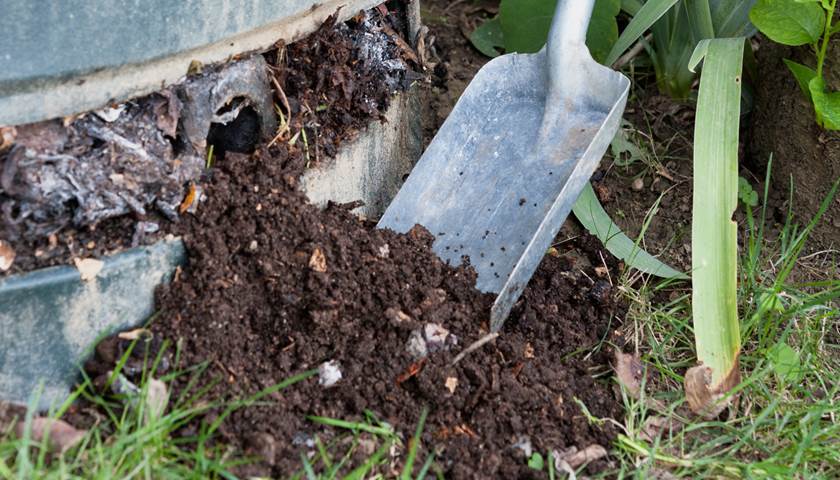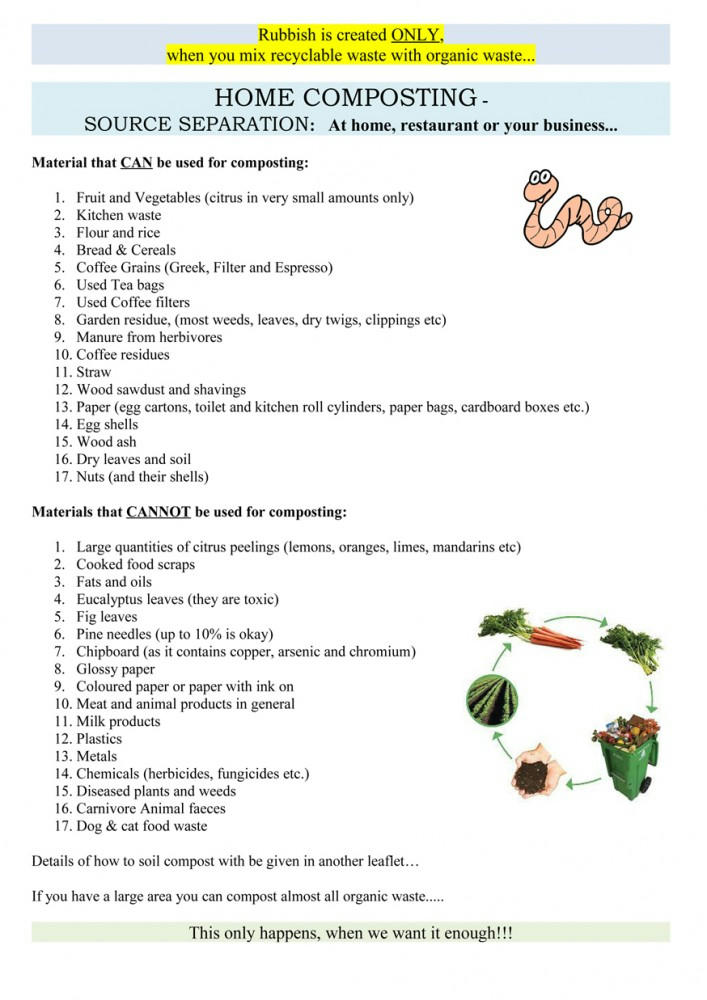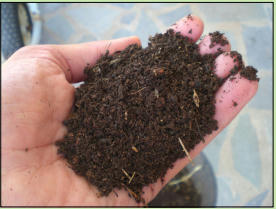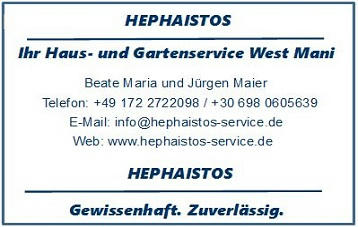Household Composting
Household composting contributes to reducing waste and to recycling.
For further information, please contact either Peter Rollett peterrollet738\msn or Evangelos Katsouleas evangelos.katsouleas\gmail
COMPOSTING IN GREECE
With the aim of reducing waste, composting is something that all of us can do.
Please see the YouTube video Easy Composting Tips for more information.
Also find information on the CLEAN MANI website:
Tips for composting yourself

You can put vegetable, fruit and garden waste in the organic waste bin, but you can also compost it yourself, in the garden or on your balcony.
If you do this in the right way, you will save energy and reduce the amount of waste. As a reward you get free good soil improver for the garden.
Tips for your own compost heap or worm bin.
1. Provide adequate aeration, humidity and variety of the compost pile.
Then you will not be bothered by unwanted gases and stench.
2. Place a compost heap at least 5 meters away from surface water (such as a ditch).
This prevents contamination of the surface water by leaching fertilizers from the compost.
Self composting and environmental impact
It is not known whether composting yourself is better for the environment than large-scale composting of vegetable, fruit and garden waste (VFG). It is clear that composting yourself can be an environmentally friendly option, because the waste does not have to be transported and processed. However, this only applies if you compost properly; otherwise any environmental benefit turns into a disadvantage.
Good soil improver
Composting yourself saves energy. You process the organic waste from your household on the spot: the cycle remains small. In addition, it provides a useful end product. Compost is rich in humus and can therefore be used as a soil improver for your garden.
Incorrect composting causes greenhouse gas
But composting is a rotting process: bacteria, fungi and other soil organisms convert vegetable, fruit and garden waste into compost using oxygen. When composted incorrectly, the rotting process takes place without oxygen (anaerobic), creating methane or nitrous oxide. Both are harmful greenhouse gases.
Choose from compost systems
If you are going to compost yourself, you can choose from different systems. Which one you choose mainly depends on the size of your garden, the amount of waste to compost and the ratio between garden and kitchen waste. If you have no garden waste, a closed system is most suitable; this can also be on the balcony or in the kitchen.
Compost heap and open compost bin
A compost heap requires several square meters of outdoor space. When set up, a free-lying pile must be at least 1.5 meters high, wide and long. The compost heap will later collapse due to the composting process. The compost heap can be laid loose on the ground, or in a container made of wood, wire mesh, branches or willow. But it is better to cover the bottom with, for example, tiles; if you dig the compost heap, it is clear where the soil begins.
Compost barrel for the garden
In gardens with limited space, closed wooden or plastic composters are more suitable. You can buy these at most garden centers.
Compost barrel for kitchen or balcony
You can also compost kitchen waste in the kitchen, on your balcony or in a courtyard. There are several smaller systems for this, such as the composting drum and the worm bin.
This is how you make the ideal compost heap
Pay due attention to the compost pile or barrel. Then you prevent greenhouse gases from being created.
- Provide good ventilation. Provide adequate air throughout the compost pile. You do this by turning the compost heap completely upside down ('turning') about every six weeks. This speeds up the composting process. You cannot convert organic waste in a semi-open or closed compost bin. In such a system, a varied organic waste composition is extra important.
- Provide variety. A compost heap should be as varied as possible: moist and dry material, soft and firm, coarse and fine, carbon-rich (sawdust, prunings, straw, tree leaves) and nitrogen-rich (grass, manure, garden waste). If you have a lot of garden waste, don't put it all at once, but in portions on the compost heap.
- Provide adequate humidity. The compost heap should not become too wet or too dry. A little water now and then is fine, but too much rain will wash out the nutrients or cause a shortage of air in the compost pile. Do not place the compost heap under a shelter, nor in an open field. Under a tree, half sheltered from sun and rain, is a good place.
To put on the compost heap or not?
Not everything that can go in the organic waste bin can also go on the compost heap. This is because the conditions in the compost heap are different from those in a professional composting facility. The humidity and temperature are lower. A rule of thumb is: the more open the system, the less is allowed in.

Therefore not (or limited)
In the table above, 'limited' means: do not add a portion more than once a week. Why are leftovers allowed or not allowed on the compost heap?
Food leftovers
Cooked food scraps are often salty and fat. This makes it difficult for them to compost. In addition, they attract mice and rats. Gravy, fat (liquid) and vegetable oil also attract vermin and compost poorly. (Old) bread is too dry and starts to mold. These fungi inhibit the composting process.
Peels of non-organic potatoes and non-organic citrus fruits often contain chemical agents (germ inhibitors or pesticides). The same applies to cut flowers from the trade. These agents can be harmful to organisms in the compost heap and thus hinder the composting process.
Cat litter and poo
Cat litter should not be put on the compost heap, because they often consist of baked clay or minerals and they do not compost. The poop in the pellets can also contain dangerous pathogens (toxoplasmosis).
Poo and urine promote the composting process. However, for hygienic reasons, only herbivorous excrement, such as old straw or sawdust from the guinea pig hutch, should be put on the compost heap. Do not throw in the feces of carnivores (dog or cat).
Leaves, sawdust and ash
Only add grass clippings and leaves of chestnut, ash, maple, elder, alder, linden, willow and magnolia in small amounts. This also applies to straw, sawdust and wood ash. Because this is so dry, don't throw too much of it in the compost bin and mix it well with other material.
Weeds and diseased plants
Weeds that have seeds or sprout through their roots are also not welcome in the compost bin. And rather throw sick plants in the organic waste bin. Organic waste is composted at a high temperature and kills the germs.
Coffee pods and tea bags
Coffee pods consist of a quarter of synthetic fiber and the rest of paper. Tea bags also usually consist partly of plastic, in order to be able to melt the edges together. If this plastic ends up in your compost, these microplastics will start to roam through the soil.
Video: the basis for making your own compost
Source: TuinKracht, made for the Belgian campaign Live the Garden.
----
As part of the campaign to tackle the rubbish crisis, the W Mani Business Assoc. produced a series of leaflets to promote rubbish reduction through recycling and composting. Below are composting information/instruction pages in English and Greek. Click on the links for full size leaflets you can print out.
In Greece composting is a relatively new concept.
For information on how to compost in this climate, see the article by Kerry in the Manifest Magazine (issue 5) Here is an extract .....
I have been composting successfully  in Greece for the last years, but I have had to make a few refinements. The first issue is moisture. If you have an open heap then it will quickly dry out between the months of May to September, so it is better to contain the waste. Even so during the summer a light sprinkling of water is required about once a week. Keep the pile covered with cardboard or old cotton fabric to conserve moisture.
in Greece for the last years, but I have had to make a few refinements. The first issue is moisture. If you have an open heap then it will quickly dry out between the months of May to September, so it is better to contain the waste. Even so during the summer a light sprinkling of water is required about once a week. Keep the pile covered with cardboard or old cotton fabric to conserve moisture.
A household shredder is used to shred our scrap paper and thin cardboard. This is then added to the composting pile to keep it light and airy but also to absorb and conserve moisture.
The third ingredient to successful composting is an activator. For this I use a sack of goat manure (fouski) from the local nursery. A sprinkling every now and then adds nitrogen which accelerates the breakdown and probably adds useful bacteria. The heat generated will also kill many seeds in the pile and act as a steriliser. If the mixture is not mixed well it becomes anaerobic, where the lack of oxygen will lead to a foul smelling mess.
The sort of things that you can add from your kitchen are uncooked vegetable and fruit waste, fish bones, tea bags, coffee grounds and egg shells but no cooked food or meat......
Kerry also has a wormery with a special type of worm that will stay within the compost heap, so it is possible to have a compost heap without a special container. These worms will do the same job as goat manure. If you want to know more about this contact Kerry on 27210 78240 info\thespiritoflife.co for information and a supply of worms for your heap! Before long you will have enough worms to supply your friends. Lets start worm chains!
There is also a useful website HOW TO MAKE YOUR OWN WORM COMPOST with detailed instructions on getting started.
Vermiculture, or worm composting, allows you to compost your food waste faster than you ever imagined, while producing the highest quality compost and fertilizing liquid.
Best of all, it's self-contained and nearly odorless!
In Kalamata, composting units can now be purchased at various nurseries and supermarkets and also at Fifa Farm, tel Myrto on 6972755079.
















 Together in the Mani
Together in the Mani